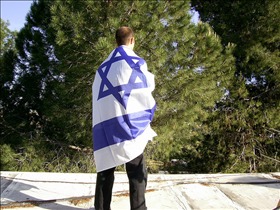How Many Secular Jews Are There Really?
From media reports, a picture emerges of a strengthening of religion and observance of the commandments among the Jewish population in Israel, but actually, the reality is different: the public support for freedom of religion is steadily growing. Rabbi Uri Regev is convinced that the issue is becoming increasingly political, and whoever doesn't understand this in time will simply lose at the ballot-box.
14/10/2010 12:16
Tags:

A secular man prays for the success of the country. Photo: zeevveez
21% of the public describe themselves as "having strengthened religiously". This was the spirit of article headlines about the last survey on religion by the Central Bureau of Statistics (C.B.S). From the reports, which are based on a press release by the Bureau, a picture emerges of a strengthening of religion and patterns of commandment observance among the adult Jewish population. Among other things, it is reported that the secular Jewish population keeps many commandments. For example, 72% of secular people went to a synagogue in the last year. Thus, 200 thousand people over the age of 20 (the population sample of the survey) described themselves as newly religious.
This description is very different from the one I know, which comes from public opinion surveys compiled for the organization Hiddush – Freedom of Religion in Israel by the Smith Institute. Indeed, a check of the complete data of the religion survey of the C.B.S. shows a significantly different picture from that which emerges in the media reports. The percentage of those defining themselves as "secular" is shown as being only 42%. But what is not mentioned is that in recent years the C.B.S. has created an additional category of "traditional not that religious" people (referred to hereafter as traditional N.T.R.). The question must be asked, of course, how are we to regard this group, which represents 25% of the Jewish public? Analysis of a scale of commandment observance and customs in the survey reveals that only 7% of traditional N.T.R. Jews refrain from travel on shabbat, and only 11% of them regularly pray. It seems therefore that this is an additional category created for the tradition-conscious secular population, and perhaps one this section of the public is more comfortable with. Hence 67% of the public in Israel is secular by one definition or the other.
The public is fed up with the cynical selling off of their rights
Against the phenomenon of "strengthening" and becoming newly religious, there is a dynamic of the "weakening of religiosity" and an openness to Jewish experiences that are not bound by the chains of Orthodoxy. While only 3.3% of those who grew up in a secular home describe themselves as religious or
61% of the public support Israel's recognition of civil and non-Orthodox marriages
haredi today, 28.4% of those who grew up in a religious home state that today they are "traditional not that religious", or secular, and 18.6% traditional religious. 70% of those that grew up in a secular home and who were religiously "strengthened" still define themselves as secular or traditional N.T.R.
This data fits well with the picture presented by the data in the summer 2010 Index of Religion and State which Hiddush submitted to members of the Knesset this week. According to the survey conducted by the Smith Institute, 80% or the adult Jewish population are opposed to new religious legislation, compared with 10% in the previous Index. The Religion and State Index also reveals that 61% of the public support Israel's recognition of civil and non-Orthodox marriages. 61% of the Jewish public support breaking the Orthodox monopoly on conversions.
The conclusions are clear: support for freedom of religion is steadily increasing. At the same time, the gap between the coalition's current policy of capitulation to haredi parties and the position of the public is widening. The parties in the coalition should also pay attention to the political findings in the Religion and State Index. 35% of the public, more than a third, are highly likely to vote for a new party favoring freedom of religion and equal burden sharing, if such a party should emerge. There is no doubt that the public is sick of the cynical selling off of their rights and future in exchange for the coalition's potage. The public wants a civil government which will carry out a civil revolution and will apply halacha in the matter of guaranteeing the right of freedom of religion and conscience enshrined in Israel's Declaration of Independence. The coming elections are approaching. Freedom of religion is expected to be a central issue in those elections. Whoever doesn't understand this in time will pay the price at the ballot-box. Until then, it is important to understand that the Jewish public in Israel, as in the rest of the world, wants a living and dynamic Judaism. The face of Judaism changes with the changing times, and one would have to be blind or cynical not to see this.